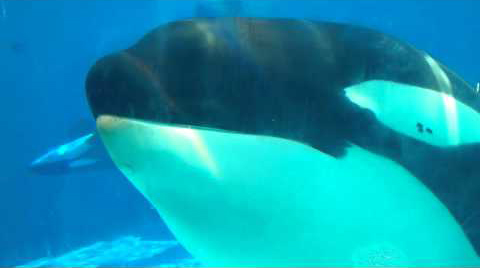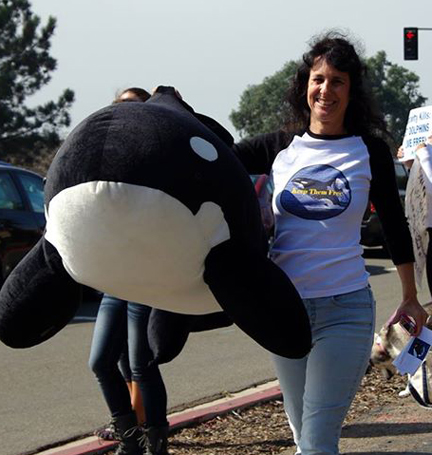This is the ninth in a series of ten in which we meet one of the San Diego 10 orcas and hear from an advocate who continues to be one of the voices of these imprisoned voiceless, never stopping until the whole world listens.
This week’s Advocate is Liz Jacobelly.
Prisoner #9: Kalia
Age: 9

Her name means “Beauty” in Hawaiian, and this lovely nine-year-old orca lives up to her name completely. Born at SeaWorld San Diego on December 21, 2004, her mother is Kasatka and her father is Keet. (Kasatka is featured in #2 of our San Diego 10 series, and Keet is featured in #5 of this series.)
Kalia’s claim to fame is that she is also known as Great Grandbaby Shamu, being the granddaughter of the very first live orca born into captivity, Kalina (Keet’s mother; Keet was her first calf).
But her most recent claim to fame is that this very young orca is pregnant. Tremendously upsetting to all those rallying for her and other captive orcas forced to breed by SeaWorld, more and more at prohibitively young ages, this 9-year old was impregnated by Ulises, the oldest male orca in captivity. (To learn more about Ulises, he is featured in #3 of our San Diego 10 series.)
Just to make doubly sure that young Kalia was pregnant by Ulises, SeaWorld Entertainment Inc. also artificially inseminated her with Ulises’ sperm. Kalia is expected to give birth this coming December. (Orcas have a 17-month gestation.)
A bill (AB 2140) is now being studied in the California legislature that would ban the park from breeding its captive orcas. The bill would also ban orca shows, ban captive breeding and prohibit the import and export of the so-called “killer” whales in California.
Currently, SeaWorld San Diego is the only place in California where orcas are kept captive, with 10 currently held and profiled in this series. At present, the bill has been sent by an Assembly committee to “interim study,” a process used by the California Legislature to collect more information for complex bills, and will be considered again in the next legislative session (2015).
Playful by nature, Kalia also has a dominant side that has shown up as she has matured – taking after her mother, Kasatka, the orca matriarch of SeaWorld San Diego. She has a tendency to put other orcas in their place. But after her mother gave birth to her younger half-brother, Makani, Kalia had mellowed out somewhat, until recently.
Still very much a momma’s girl, this youngster is now going to have to become a mother herself, much too soon in her young life. Rarely far from her mother, Katsatka, and half-brothers Nakai (Nakai is featured in #7 of this series) and Makani (Makani will be featured in #10 of this series), Kalia also spends time with Orkid and Corky (Corky is featured in #1 of this series, and Orkid is featured in #4.)
Present at the birth of Kasatka’s fourth calf, Makani, Kalia spends a great time with him, learning how to take care of a calf. So far, because of being so close to her mother and baby brother it looks like Kalia has good mothering tendencies. That is the hope. But the bigger hope is that no other youngsters in captivity will have to be force-fed motherhood ever again.
As we have reported time and time again in this series, the prognosis for orca babies born from such young mothers, as well as the mental and physical health of the mother, is dismal. It’s a death sentence waiting to happen to these youngsters.
According to the Whale and Dolphin Conservation Society, there are approximately 42 orcas known to be held captive worldwide. 137 orcas were captured from the wild starting in 1961 and 91 percent of them are now dead, ranging in age from one day to 28 years old, with the median survival age, four years old (3 of the 13 survivors are here in San Diego).
According to orca scientist Dr. Naomi Rose, male Orcas in the wild live an average of thirty years, the maximum being fifty to sixty years whereas, females in the wild average living to the age of 46 with a maximum age of eighty to ninety years. There have been 32 Orcas born in captivity and died, excluding stillbirths; 156 have died in captivity including stillbirths and miscarriages.
You can see the frustration that Kalia feels at present being in confinement, prematurely impregnated, her life at the mercy of an unnatural world that defies everything an orca in the wild would ever experience. Within our advocate, Liz Jacobelly’s profile following, you will see a link to a video of Kalia looking like she is having a breakdown. Slamming her head over and over again she is communicating sheer anguish over her circumstances. You want to cry along with her, and take her away from there forever.
This abuse has to stop. Please raise your voices and make them heard loud and clear. And hold a positive thought for this beautiful teen age mother-to-be, Kalia. We are praying for your health and that of your baby…
Prisoner Advocate: Liz Jacobelly

A native San Diegan, Liz Jacobelly is the owner of her own dance studio. When not teaching dance to children, Liz spends most of her time volunteering to help others—humans and non-humans. She started very early in her life responding to the suffering of people. It seems that Liz has never been one to turn a blind eye to others’ pain,
“I started when I was in high school volunteering at Children’s Convalescent Hospital with children that had severe mental and physical disabilities. From there I visited people with AIDS in the hospital. I would go in and visit each person at the hospital and be an ear for them to talk to or just even hold their hand.
Then I volunteered at my church making meals for the homeless. We also got to know the people who lived on the streets and helped them with jobs and housing. I also visited elderly people in nursing homes and those that were confined to their homes. I volunteered for two summers helping rebuild houses in Mississippi for those who lost their homes from Hurricane Katrina.”
Though she is always there to help people who need her, Liz is now dedicating her life:
“… to those non-humans who do not have a voice. Animals communicate but most people do not listen. After watching an undercover video on factory farming I became vegan. The thought that these animals are not only killed for our food but also suffer unspeakable abuse is appalling.
“I spend my spare time doing vegan outreach to educate others about the cruelties that farm animals suffer. I also spoke out to close Casa Beach during pupping season. I also speak out for mother dogs in mass breeding puppy farms that have their puppies taken away and shipped off to pet stores.
One recent campaign I was involved in was the Ordinance to ban stores that sell puppies, kittens and rabbits in San Diego. I found that it is all about profit for those involved in this cruel industry and for many of those government, city and county decision makers that will not pass laws to protect the animals.
“Now I am dedicated to speaking out for the 10 orcas at SeaWorld so they may be released and rehabilitated to sea pens.
“When I was young I went to SeaWorld and loved watching the Shamu show. I thought it was so much fun for the orcas. I will never forget after one of the shows I witnessed Shamu in the small tank in back. I wondered how he could swim or turn around. What SeaWorld taught me at that young age was it was alright for a killer whale to live in a small tank.
“Now as an adult I realize that it is wrong for any animals to be confined to small enclosures. I learned that orcas swim up to 100 miles a day and live in family groups called pods. The orcas that were caught in the wild were taken away from their families and put in with orcas from different cultures and areas. I also learned that they are used for breeding so another baby Shamu can bring money and customers to the park.
“In captivity most calves are taken away from their mothers where in the wild they would stay together for life. I’m among the majority of families who don’t want to patronize a park that teaches kids it’s acceptable to use and abuse another species for entertainment. Watching a dolphin jump through a hoop or an orca splash and do tricks is not educational. It is not conservation and it is not ethical.
“As an advocate for Kalia, it breaks my heart that she has never known what it is like to be free in the wild. Kalia is pregnant at only 9 years old, when in the wild orcas do not mature and start mating until age 14 or 15. This could be a life threatening situation for her. She will be giving birth to this calf and will most likely be separated from her mother or her calf or both.
If you are a mother or father, you can understand the grief that these mother orcas go through when their babies are taken away from them to send to another park. There is a recent wrenching video of Kalia showing her having a tantrum (As seen in this link below.) It’s heartbreaking witnessing her deep frustration to not be able to live the life that she deserves.
“When is holding these highly intelligent social cetaceans in captivity going to stop?
“One day in the far future people will look back and say ‘I can’t believe the inhumane way that animals were treated for profit.’ I wish that day were here with all my heart.”
CALL TO ACTION: Sea Shepherd is asking supporters to send polite comments to the National Aquarium encouraging them to move forward with their plans to close their “Dolphin Discovery” exhibit and relocate the dolphins to a sanctuary.
Please also urge the aquarium to explore the possibility of becoming a rehab and release facility. Let’s make it very clear to the decision-makers at the National Aquarium, and the entire captive industry, that the public will support these efforts! Please use the form at the bottom of this link to send your message to the National Aquarium.
“Until we extend our circle of compassion to all living things, humanity will not find peace.” ~ Albert Schweitzer, The Philosophy of Civilization
